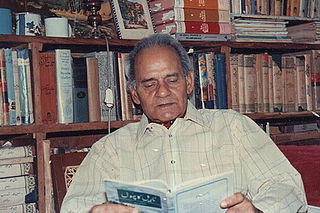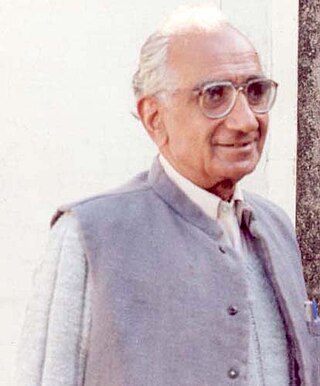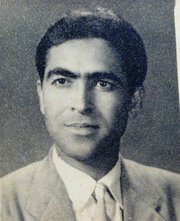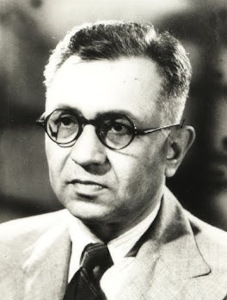
Saraiki is an Indo-Aryan language of the Lahnda group, spoken by around 28 million people in central Pakistan, especially the areas of South Punjab, Southern Khyber Pakhtunkhwa, Northern Sindh and Eastern Balochistan and the cultural region of Derajat. It was previously known as Multani, after its main dialect.

West Punjab was a province in the Dominion of Pakistan from 1947 to 1955. It was established from the western-half of British Punjab, following the independence of Pakistan. The province covered an area of 159,344 km sq, including much of the current Punjab province and the Islamabad Capital Territory, but excluding the former Princely state of Bahawalpur. Lahore, being the largest city and the cultural centre, served as the capital of the province. The province was composed of four divisions and was bordered by the state of Bahawalpur to the south-east, the province of Baluchistan to the south-west and Sind to the south, North-West Frontier Province to the north-west, and Azad Jammu and Kashmir to the north. It shared International border with Indian state of East Punjab to the east and Indian-administered Jammu & Kashmir to the north-east. It was dissolved and merged into West Pakistan upon creation of One Unit Scheme, in 1955.
Mahmood Shaam born Tariq Mahmood on 5 February 1940, is a Pakistani Urdu language journalist, poet, writer and news analyst.
Intizar Hussain or Intezar Hussain was a Pakistani writer of Urdu novels, short stories, poetry and nonfiction. He is widely recognised as a leading literary figure of Pakistan.

Mustansar Hussain Tarar S.I. is a Pakistani author, travel enthusiast, mountaineer, writer, novelist, columnist, TV host and former actor.
Sher Muhammad Khan, , better known by his pen name Ibn-e-Insha,, was a Pakistani Urdu poet, humorist, travelogue writer and newspaper columnist.
Saraiki literature refers to works written in Saraiki, an Indo-Aryan language predominantly spoken in the southern regions of Punjab, Pakistan. Written in the Arabic script, similar to Urdu and Punjabi, Saraiki is spoken by millions across districts such as Multan, Bahawalpur, and Dera Ghazi Khan.

Mumtaz Husain, better known as Mumtaz Mufti, was a writer from Pakistan.

Abdul Hameed was an Urdu fiction writer from Pakistan. He was also known for writing a popular children's TV play Ainak Wala Jin (1993) for Pakistan Television Corporation which was broadcast on PTV during the mid-1990s. He's also known for his Maut Ka Taaqub series, a novel for children spread over 300 issues and counting 35,000 pages.

Attaullah Khan NiaziSI PP, known professionally as Attaullah Khan Esakhelvi, is a Pakistani musician, singer, and poet from Isakhel in Mianwali District, Punjab. He is mainly associated with the folk music of Punjab and has written various songs and poems in the Saraiki language.

Jagan Nath Azad, was an Indian Urdu poet, writer and academician. He wrote over 70 books, including poetry collections, poems, biographies, and travelogues.

Layyah, previously spelled as Leiah, is a city in Pakistan. The city is headquarter of Layyah District and Layyah Tehsil. It is the 75th most populous city of Pakistan.
The publishing industry in Pakistan is hampered both by a low literacy rate (65%).

Saraiki culture is the culture of the Saraiki people, residing in Pakistan and outside Pakistan.

The Balochs of Punjab are a community of Saraiki and Punjabi-speaking tribes of either full or partial Baloch descent settled in the Punjab province of Pakistan. The majority of which live in southern Punjab, including Dera Ghazi Khan and Rajanpur, which adjoin the province of Balochistan. Numerous of which no longer speak Balochi and instead speak Punjabi, Saraiki and Sindhi.
Pakistani English literature refers to English literature that has been developed and evolved in Pakistan, as well as by members of the Pakistani diaspora who write in the English language. English is one of the official languages of Pakistan and has a history going back to the British colonial rule in South Asia ; the national dialect spoken in the country is known as Pakistani English. Today, it occupies an important and integral part in modern Pakistani literature. Dr. Alamgir Hashmi introduced the term "Pakistani Literature [originally written] in English" with his "Preface" to his pioneering book Pakistani Literature: The Contemporary English Writers as well as through his other scholarly work and the seminars and courses taught by him in many universities since 1970's. It was established as an academic discipline in the world following his lead and further work by other scholars, and it is now a widely popular field of study.

Begum Khurshid Mirza, also known by her screen name as Renuka Devi, was a Pakistani television and film actress, who had been active from the pre-partition era to the 1980s.

Rahim Gul was a famous Urdu language Pakistani writer, literary critic, author and director and producer of films.

Syed Imtiaz Ali Taj was a Pakistani dramatist who wrote in the Urdu language. He is best known for his 1922 play Anarkali, based on the life of Anarkali, that was staged hundreds of times and was adapted for feature films in India and Pakistan, including the Indian film Mughal-e-Azam (1960).

Riaz-Ur-Rehman Saghar was a poet and a film song lyricist active in Pakistani cinema.













